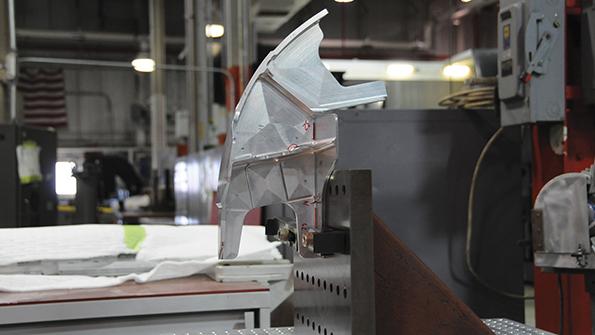
The COVID-19 pandemic has exacerbated some of the risks that have always existed in the defense industrial base. Although government assistance and a robust Pentagon budget have helped offset initial trials, more challenges are looming.
- Elbit Systems of America sees opportunity to grow
- Analysts note trend toward reshoring business to the U.S.
One of the biggest risks to the defense industrial base is that some companies serving the military are too heavily leveraged toward the commercial sector or too reliant on international companies, financial analysts told Aviation Week’s DefenseChain Conference.
“Some of these places are two weeks from bankruptcy,” says Chris Celtruda, managing principal at Destiny Equity Partners, says. Suppliers are beginning to falter because of a combination of factors, including the need to comply with cybersecurity standards, the pressure that prime contractors such as Boeing and Lockheed Martin have applied to them and their reliance on commercial business. A prime example is the recent bankruptcy of Impresa Aerospace, a Wichita-based company that made parts using computer numerical control machines as well as sheet metal parts and assemblies for Boeing and Lockheed military aircraft but was highly dependent on its work for the commercial Boeing 737 MAX.
The U.S. federal Paycheck Protection Program helped delay some business failures, but others are inevitable, says Rick Nagel, managing partner of Acorn Growth. “The Impresa bankruptcy is an example of a lot more insolvencies we may see,” he adds.
Weakness among niche companies could pose a problem for the Defense Department in the future. “I’m always amazed at how many critical systems have multiple single points of failure on major programs,” he says.
At the Pentagon, officials have been working to keep essential suppliers afloat and to keep production moving through its sprawling international industrial base.

For the U.S. Army, that has meant initial disruptions to Apache fuselage production in India and to the flow of generators from Mexico. The Pentagon and the State Department helped ease the stoppage, but the incident has caused them to review the full range of risks to its international supply chain.
“I think that we can navigate through this, though it’s certainly always going to be complex in today’s global economy,” says Patrick Mason, deputy program executive officer for U.S. Army Aviation, adding that he is in the position of putting pressure on vendors to reduce cost, particularly to provide savings on multiyear aircraft contracts.
One trend emerging along with the pandemic is a movement toward onshoring or reshoring overseas business for reasons of cybersecurity and the protection of the U.S. industrial base.
As that happens, and as the commercial aviation market sags, Raanan Horowitz, president and CEO of Elbit Systems of America sees opportunity. “We are trying to position ourselves around some of those discontinuities,” Horowitz says, adding that the company likes going after opportunities that are not necessarily glitzy but hold value. “We are intensifying efforts toward looking at licensing, taking over orphan product lines and positioning ourselves to be part of the long-term solution.”
Horowitz says Elbit is investing in U.S. infrastructure to capture new business. Industry officials see broad support for bringing more of the defense supply chain back to the U.S. The shift stems in part from the COVID-19-related economic downturn but also from longstanding concerns about China. In the fiscal 2020 National Defense Authorization Act, Congress passed restrictions on contracting with companies that use Chinese telecommunications equipment.
Though companies first look for the best value, the threat posed by Chinese parts that either do not work or could transmit classified information back to China is an ongoing concern, says John Luddy, vice president for national security policy at the Aerospace Industries Association. “The concept of reshoring of supplies to better connect our allies and friends, both from a production standpoint and from an operational functionality and alliance standpoint, I think the volume is getting turned up on that a little bit,” he says. “There’s also a strong impetus in Congress to look at exactly how vulnerable we are. That’s going to be a more intense discussion in the year to come than it has been.”
And that trend toward reshoring could have unintended consequences, warns Steve Grundman, founder and principal of Grundman Advisory.
“I’m genuinely concerned that benign moves to secure our supply chain to prevent nefarious supplies and code [coming] into particularly our defense supply chain or commercial aerospace supply chain could slip very easily into protectionism,” Grundman says. “If you want to really put pressure on the defense budget, ask the defense industry to reshore the supply chain.





